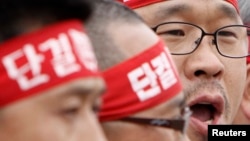Some high drama played out on the streets of South Korea's capital Thursday after nearly 1,000 police threatened to storm a Buddhist Temple where a fugitive labor leader had claimed sanctuary.
Police surrounded the Jogye Temple in downtown Seoul on Wednesday in preparation to arrest Han Sang-gyun, the leader of the Korean Confederation of Trade Unions. He is accused of inciting violence during a massive labor demonstration on November 14 and for organizing illegal labor rallies in the past.
Han was one of the leaders of a number of protests organized this year to oppose a new labor reform bill backed by South Korean President Park Geun-hye to make it easier for employers to fire workers.
Tens of thousands of labor supporters participated in the November rally, where protesters fought police with steel pipes and police used water cannons and barricades to stop the crowd.
Many of the protesters were there to voice other grievances against the government, including its recent a decision to create a state-approved history textbook in the nation's schools.
Han denies inciting any violence at the demonstration.
“I am not a murderer, a heinous criminal, a thief, nor an instigator of riots. I am a fired laborer,” Han said Thursday while speaking in front of the temple.
After the demonstration Han sought sanctuary in the Jogye Temple.
The Buddhist leaders at the temple intervened with police Wednesday, urging them not to enter to allow more time to negotiate.
“If the police raid the temple it will be nothing less than a state crackdown on the Jogye order and on Buddhism in Korea,” the order said in a statement.
On Thursday Han agreed to surrender to authorities prior to the noon deadline set by the police, but vowed to continue to lead the labor movement and organize future rallies.
“I will continue to fight because the way to save our deplored citizens is the way of the Korean Confederation of Trade Union,” he said.
There is no law preventing South Korean police from entering religious sites to carry out arrests, but authorities are reluctant to do so. A police raid on the Jogye Temple in 2002 to apprehend seven labor activists sparked strong public criticism. In the 1980s a number of South Korean pro-democracy activists sought sanctuary in Catholic churches.
Han’s KCTU union is second largest union in South Korea with over 691,000 members in construction and transportation industries.
But there is strong public support for President Park’s labor policies according to recent polls.
For some of Park's opponents, the standoff between police and the labor leader stirred memories of South Korea’s authoritarian past, when her father, General Park Chung-hee, who seized power in a military coup in 1961, used police to suppress political and worker opposition.
Youmi Kim in Seoul contributed to this report.





